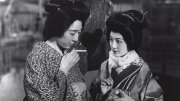The Harvard Film Archive’s retrospective “Floating Clouds…The Cinema of Naruse Mikio,” through November 3, offers 45 films, many capturing shōshimin-eiga (the dramas of ordinary people). The director, active between 1930 and 1967, is known for a desolate, yet not unrealistic, outlook. Many narratives “magnified the movements within human relationships as intimate responses to historical change,” notes the archive’s contributing writer Kelley Dong. After World War II, his works often highlighted women and their experiences with love, work, and family, as in Floating Clouds, Sound of the Mountain, and Flowing. Existentialism shone through, too. Scattered Clouds, his final film, reflects on the modern idea, Dong writes, “that the solitude of independence invokes both immeasurable pleasure and devastating grief because it marks the death of the past.”
Harvard Film Archive Spotlights Japanese Director Mikio Naruse
Harvard Film Archive Spotlights Japanese Director Mikio Naruse
A retrospective of the filmmaker’s works, from Floating Clouds to Flowing

Apart from You | PHOTOGRAPH COURTESY OF THE HARVARD FILM ARCHIVE
You might also like
Harvard’s Hasty Pudding Toasts, Roasts Michael Keaton
The Batman actor was “encouraged as hell” by the students around him during the 2026 Man of the Year festivities.
Tina Fey and Robert Carlock Talk Collaboration, Joke-Building at Harvard
The duo behind 30 Rock and Unbreakable Kimmy Schmidt shared insights as part of the Learning from Performers series.
Novelist Lev Grossman on Why Fantasy Isn’t About Escapism
The Magicians author discusses his influences, from Harvard to King Arthur to Tolkien.
Most popular
Explore More From Current Issue

The Trouble with Sidechat
No one feels responsible for what happens on Harvard’s anonymous social media app.

Mount Vernon, Historic Preservation, and American Politics
Anne Neal Petri promotes George Washington and historic literacy.

Harvard’s Financial Challenges Lead to Difficult Choices
The University faces the consequences of the Trump administration—and its own bureaucracy.





